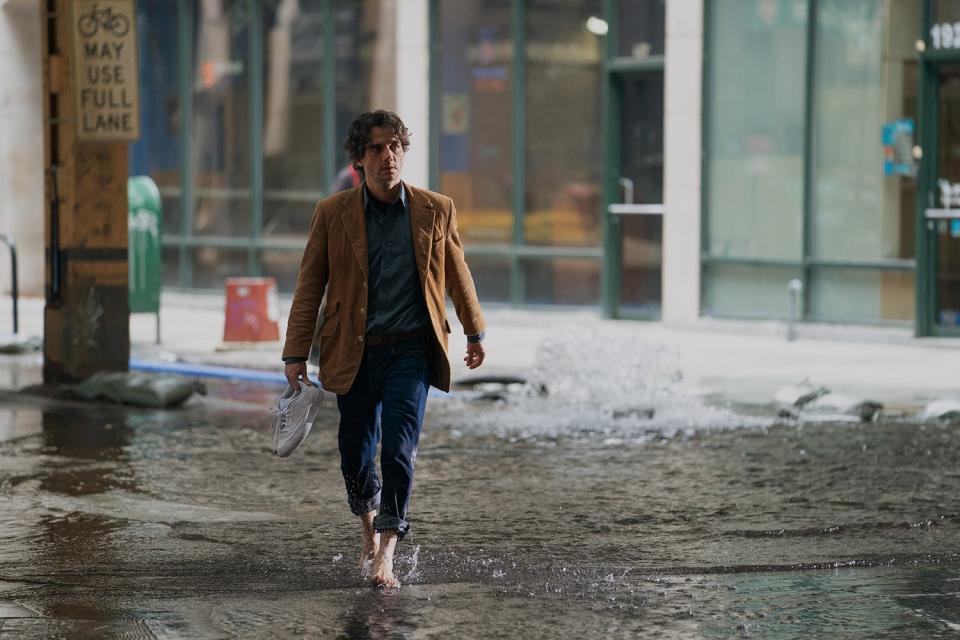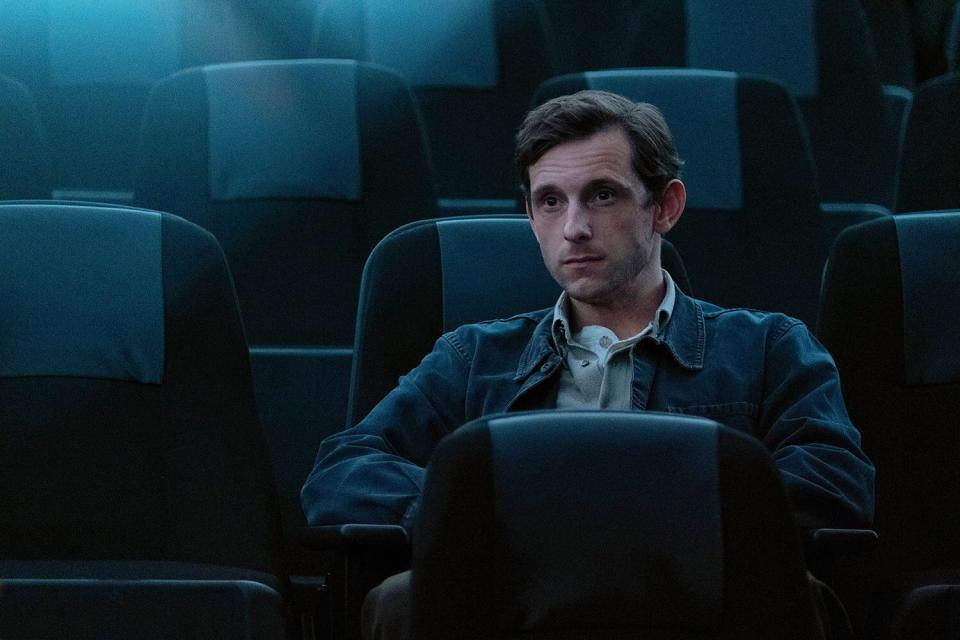Elisabeth Moss says Shining Girls was one of the 'most complicated' things she's ever done
- Oops!Something went wrong.Please try again later.
- Oops!Something went wrong.Please try again later.
How do you ground a show in which the main character's entire reality shifts at the drop of a hat, sometimes mid-scene?
This was the task at hand for the cast and crew of Shining Girls, Apple TV+'s new mind-boggling metaphysical thriller (the first three episodes are streaming now). It stars Elisabeth Moss as Kirby Mazrachi, a Chicago newspaper archivist whose journalistic ambitions were put on hold after enduring a traumatic assault. When Kirby learns that a recent murder mirrors her own case, she partners with seasoned reporter Dan Velazquez (Wagner Moura) to uncover her attacker's identity, and the two uncover a killing spree that inexplicably spans several decades.
Making matters complicated for Kirby and Dan, Kirby's life has been in constant flux ever since her assault. One minute, her hair is blonde and long, the next it's short and brown. One minute, she's got a dog, and the next she has a cat.
A lot of visual aids were needed to keep everyone on track, says series creator and showrunner Silka Luisa. "Any time you're having shifting realities in different time periods, it's a lot of charts. A lot of timelines. Everyone had to be on the same page in terms of the whole production team," she says in the latest edition of EW's Around the Table video series, where she's joined by Moss, Moura, Jamie Bell, and director and executive producer Michelle MacLaren.
Fans of Lauren Beukes' 2013 novel The Shining Girls on which the series is based will note that these changes in reality differ from the book. Luisa says these and other changes throughout the show were born of a desire to keep the series subjective to Kirby's experience.
"The book has multiple perspectives. You meet multiple women, and you also spend a lot more time in Harper's [the killer, played by Bell] point of view. For me, the character who I connected with most was Kirby," she says. "And so, I really wanted us to be with her along that journey. And so, once I made that change, and you're really with her through the show, I had to rework some of the mythology to make that happen." Adds MacLaren, who directed the first two episodes: "I think the time shifts are a metaphor for the aftermath of trauma. And Kirby's world is constantly shifting and throwing Kirby off balance, but also throwing the audience off balance." (Watch how it all came together in the behind-the-scenes footage, below.)
This all meant that Moss — who pulls triple duty as executive producer and director of two of the series' eight episodes — really had her work cut out for her. "It was incredibly challenging, honestly. You always shoot everything out of order, when you're making anything, of course. But shooting this out of order was very much a mind-bender," she says of keeping it all together, adding that sometimes because of the nature of shooting in blocks, they'd be filming parts of episodes 1 and 5 on the same day. "There needed to be a very tight relationship between the three directors, Michelle, Daina [Reid], and I, and Silka, just on keeping track of the various things that we had to keep track of. What had happened? What hadn't happened? What was about to happen? It was definitely one of the most complicated things I've ever done."
For Moss, it was helpful to remember that, from Kirby's perspective, the shifts had been happening to her for several years and weren't anything new. Still, the changes happen over and over and over again throughout the series, and the Emmy winner says it was difficult to come up with "new and different ways" to react to them. "It was hard to figure that out, having no basis for that, in reality, of what one would do," she says.
Visually, the shifts are represented by a lot of small details changing — the hair, the furniture, a coffee cup, etc. — in an effort to make things feel "really grounded and real," says MacLaren. "We didn't want them to feel supernatural. We didn't want it to be a lot of CGI. So, we started out very simply and did it editorially. And then they grew, as they get bigger and bigger. But I think we always kept them pretty grounded. It's more tangible for the audience."
So, did they manage to keep it all straight? "I think we only had one or two moments where we may have forgotten that we were supposed to do something, and they'll be kept secret forever," Moss jokes.

Wagner Moura plays Dan in 'Shining Girls.'
Another special part of the show's DNA is Moura's character, Dan. For the Brazilian actor, it was a dream come true to play a journalist. In fact, the actor graduated with a degree in journalism from the Federal University of Bahia, and after working briefly for Bahia TV, left the profession to pursue acting full time. Naturally, the role allowed him to return to those roots.
"I think that, especially nowadays, where journalism is such in a weird space, in a weird position with people getting information through social media and the spread of fake news and with world leaders discrediting the work of journalists — and my background is journalism — so, I was very excited about that, about playing a journalist. I think that was my first way through the show: the ethics of a journalist," he says.
The other way into his character was understanding the relationship between him and Kirby. "I love the way these characters recognize in each other the same wounds and scars. And they both are trying to get their lives back on track. That was really also a way for me to get in Dan's universe," Moura says.
Bell plays the show's killer, Harper, whom the actor describes as a "deranged sociopath."
"The show does something very clever and also very different, where it's telling you right up front, 'It's him. It's me. I did it.' So then, the journey of the rest of the show is not, who done it? But it's, how did he do it?" Bell explains, adding that he was very careful to not play him as a "boogeyman."
"If you just play him as threatening and creepy, it's not really creepy. So, in my mind, if he's meant to be intimidating, maybe let's do it [where, for him,] he's in a romantic scene. Or, maybe it's a meet-cute, actually, in his mind. Or it's a dream or a fantasy. It was always trying to find the other things to play in it," he says.

apple tv+ Jamie Bell plays Harper in 'Shining Girls.'
Bell credits the "incredible invention" of Beukes' source material, as well as Luisa's additions to it, with making the character a treat to play. "The journey there of the character is the unraveling of that control and what lies underneath this man who has this desire to extinguish, this desire to control, to dominate," he says. "Underneath it is obviously someone who's very weak, who was incredibly humiliated, who is diminished, emasculated. Knowing that all of that lies underneath and knowing that the show would go to these places and allow me to unravel that and have him spiral out of control was really thrilling."
Despite the fact he plays such a "distasteful" and "abhorrent human being," Bell says he felt that his experience making the show was an incredibly rewarding one, a sentiment echoed by Moss, Moura, MacLaren, and Luisa. "I still consider myself, really, a student of this stuff. I've been doing it for 20 years or whatever, but I'm learning constantly. And I'm only doing one job here. For Lizzie [Moss], who's pulling three jobs, it did make me think I should be maybe doing more with my life, a little bit," he says with a laugh, adding, "but I genuinely felt inspired. By Lizzie. By everyone."
Moura agrees, calling the set "a great environment to work" despite the heavy subject matters Shining Girls tackles. "This is a series — it's a mix of genres. It's a crime story. It [also has] sci-fi elements. But I think that, in its core, this is a series about femicide and women getting killed just because they're women," he says.
"It's a very heavy thing. And it's something that resonates a lot with me, coming from Brazil ... this is something that happens all the time [there]," Moura adds. "But the environment that we had [on set], and I think that this is a lot because of Lizzie, was very light and fun and nice. I felt great doing the scenes with her. So, this was great. I was very happy. It's great when you leave the set feeling like, 'Oh, that was great.' That doesn't happen all the time."
For more with the cast and crew of Shining Girls, watch the full Around the Table video above.
Check out our daily must-see picks — plus news, celeb interviews, trivia, and more — on EW's What to Watch podcast.
Related content:

